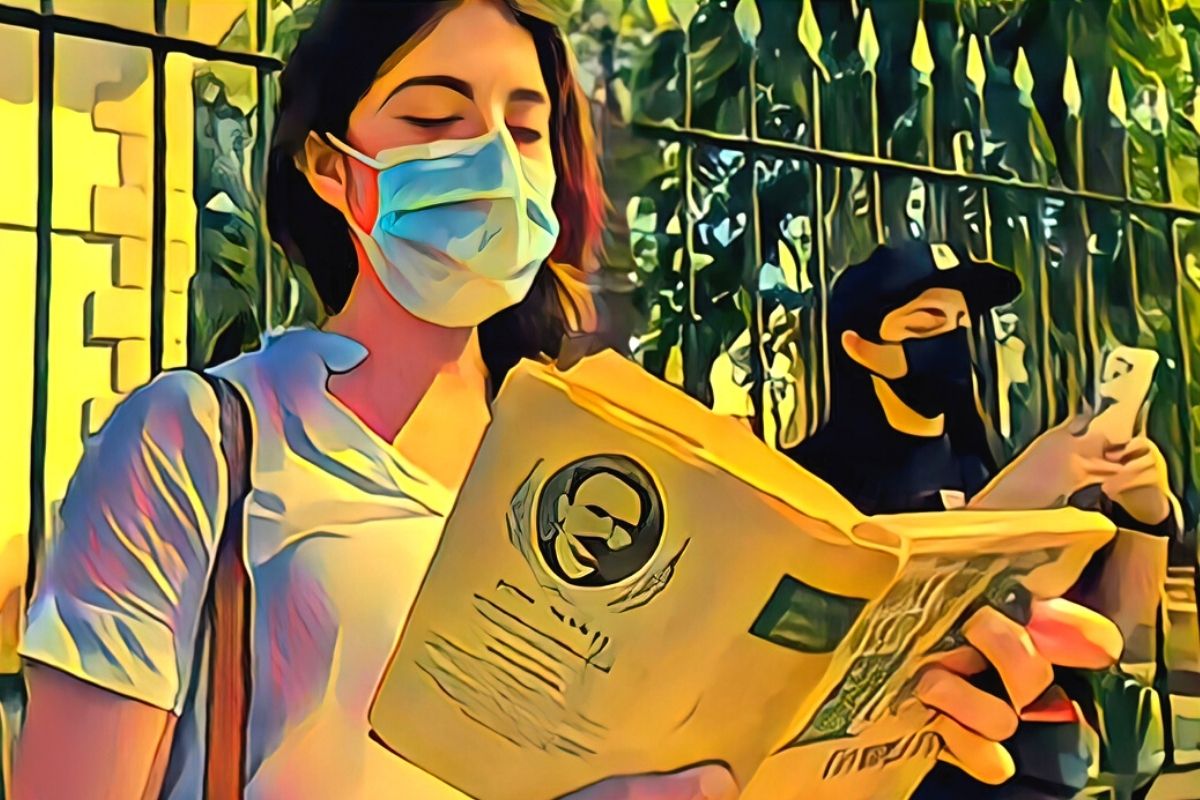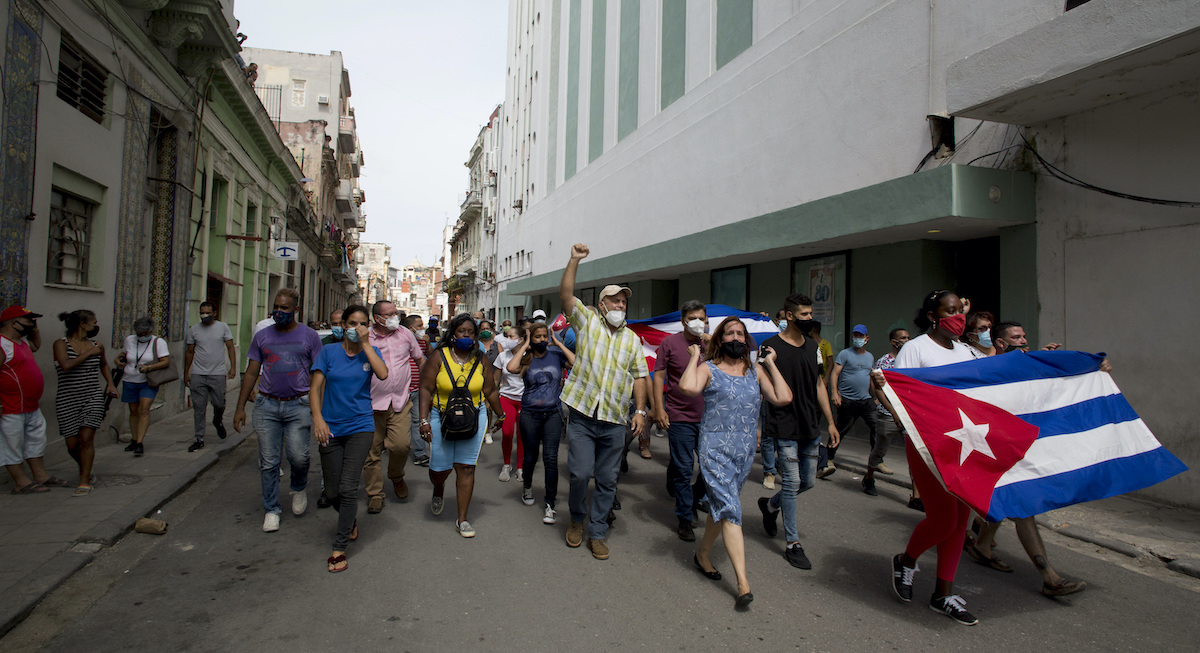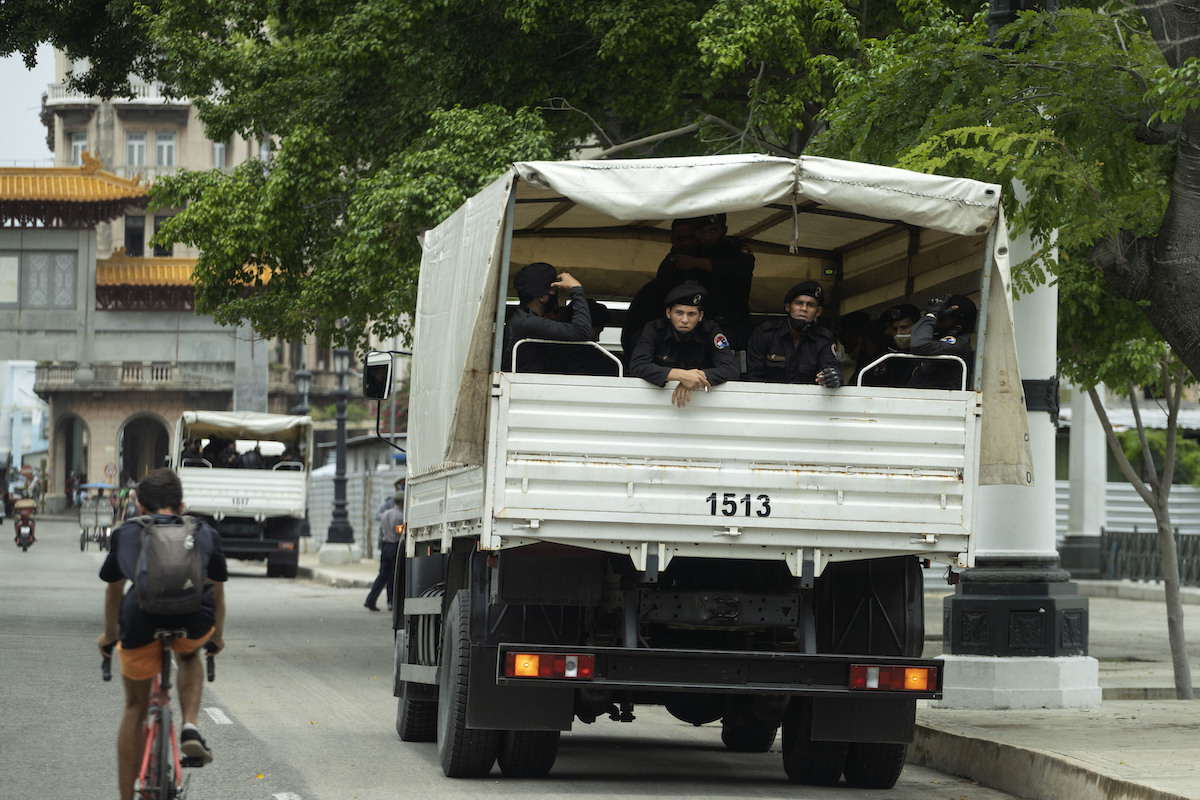

Featured illustration by EL TOQUE.
Carolina Barrero didn’t know that returning to Cuba after living abroad for years to join a protest movement would mean that she would witness the largest demonstrations the island had seen in decades.
“When we went to sleep on the 10th of July, no one could imagine what would happen the next day,” the young art historian remembered.
The morning of July 11th, dozens of videos started to circulate on social media, showing Cubans shouting “Abajo el comunismo,” protesting in front of the Communist Party affiliate offices all across the island and expressing their frustrations about a “collapsed” healthcare system, power outages and food shortages amid a global pandemic. Overall, protesters demanded change from a one-party government that has ruled for over 60 years.
The government rapidly deployed its security forces to disperse the crowds. A protester named Diubis Tejeda died in Havana after getting shot by a police officer, according to the Cuban Observatory of Human Rights (OCDH, in Spanish).


Backers of the government march in Havana, Cuba, Sunday, July 11, 2021. Hundreds of supporters of the government took to the streets while hundreds protested against ongoing food shortages and high prices of foodstuffs. (AP Photo/Ismael Francisco)
Barrero wanted to step out of her apartment in La Habana Vieja to join the demonstrations, but she couldn’t. She had already been put under house arrest after participating in previous protests propelled by artists. She was charged with defying the authorities, inciting crime, and printing clandestine flyers, but she denies having committed any crimes.
In the days that followed the July protests, hundreds of Cubans were charged with instigating unrest, vandalism, and propagating Covid-19. Some underwent summary trials without access to a defense lawyer, according to international human rights organizations.
The international media attention has faded away from the island, but activists like Barrero say the government has doubled down on its policing tactics, suppressing any expression of dissent on the streets.
Meanwhile, as of the end of September, more than 500 Cubans remained in detention, according to the local NGO Cubalex.
Some of those who remain imprisoned are artists from Movimiento San Isidro, a coalition that was founded in 2018 to oppose a new decree they said limited freedom of speech. Luis Manuel Otero Alcántara, a performance artist who has been one of the most known faces of the protest movement, and Maykel Osorbo, a rapper who participated in the hit song “Patria Y Vida,” are still jailed.


A truck of special forces police sits parked outside National Capitol building in Havana, Cuba, Wednesday, July 14, 2021. (AP Photo/Eliana Aponte)
The Cuban government claims there was “no social uprising” and says detainees were processed under the law. It also blamed hardships on U.S. sanctions and claimed Washington and its “allies” were using social media to organize and purposely create disruption on the island.
In the months that followed the unrest, the government launched some economic measures to handle the crisis, but it also issued a decree to tighten control specifically on social media.
In this episode of Latino USA, we speak with Carolina Barrero from her apartment in Havana, where she has been on house arrest for more than three months. She had to borrow cellular data in order to do the interview because she says she is denied access to internet connection. We discuss what it means to be under house arrest on the island, the “myth” of Cuba, and how young generations are questioning the government’s understanding of what communism is.
Activists announced a new series of protests on November 15. The government banned the demonstrations and warned last week that those who participate “will face legal consequences for promoting and participating in illegal marches.”
This episode was produced by Patricia Sulbarán.
***
Latino USA with Maria Hinojosa, produced by Futuro Media, is the longest-running Latino-focused program on U.S. public media.



What those who still espouse a romantic view of extreme leftist governments and movements fail to understand (including those who make excuses for the Castroist regime in Cuba) is that Marxism-Leninism and Fascism are evil twins born of the same distorted interpretation of socialist ideas and ideals. They share the same totalitarian political worldview that doesn’t tolerate any real dissent or criticism and they both use the same repressive measures to remain in power once they take it. The only difference is in their economic worldviews… which is scant consolation to their respective victims.
It is hard to see how any other country who has faced the most brutal economic, political and sometimes military actions all for a staunch policy of regime change would address dissent. It’s obvious that there has to be basic changes to the internal policy of Cuba, but those changes can not come from the outside of Cuba, or be forced by regime change. The several youth that were arrested during those protest for acts of destroying property and confessed that they were paid from $200-$500 is a clear sign that CIA money is going beyond the multi-millions that they give to the Cuban exile community every for Radio Marti to promote and instigate the Cuban populace. I would love to see what would happen if the Obama policies that were all rescinded by conservative republican Trump and now worsened by a democratic Biden who has gone back on his word would have been allowed to flourish. We were in Cuba several times after Obama’s visit. The entire country was beginning to flourish by the opening of thousands of small independent mom and pop and individually owned businesses. No one was protesting, well yes, thier were many protest in Miami against Obama and his reopening policies. Ironic, but true.
I’m the economic embargo’s staunchest critic when it comes to US foreign policy toward Cuba because I much prefer the carrot over the stick in all cases but with all due respect I think you’re throwing the baby with the bathwater. It strains credulity to claim that ALL Cuban dissidents for the past 62 years have been paid CIA agents that have acted purely out of economic interest. If you truly believe that one there’s a fine bridge in Brooklyn I can sell you real cheap. The fact of the matter is that while undoubtedly there have been acknowledged efforts by the US to destabilize Cuba and effect regime change in Havana, not all dissidents could possibly be US stooges and there are many legitimate grounds for honest and patriotic Cubans of all stripes, both inside and outside Cuba, to criticize and oppose the Castro regime on many economic, political and human rights grounds. To believe otherwise is to belong to the Joseph Goebbels school of public relations, to which the Cuban government has dogmatically and unerringly subscribed for the past 62 years. And as the State of Israel has shown since 1948, it IS possible for a country that has to contend with a hostile neighbor or neighbors to have a functioning democracy based on free speech and free and fair elections. Your brave effort to minimize, whitewash and sugarcoat the Castro government’s abuses is duly noted Mr. Pabón but your arguments fail to impress me and I very much doubt you’ll find many takers. Please let me know if you’re interested in that bridge…